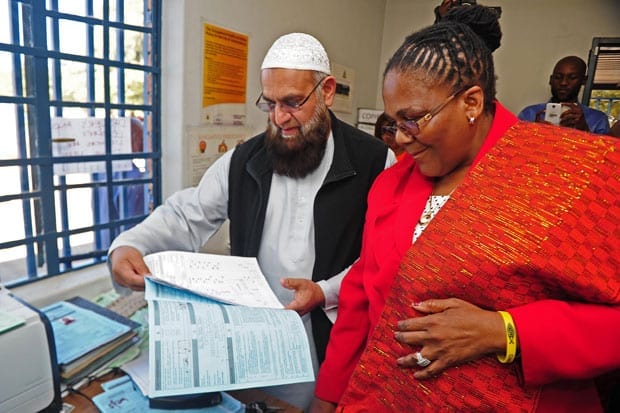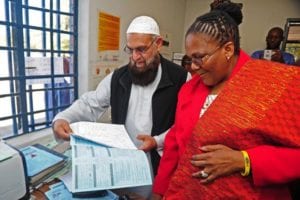
Gauteng Transport MEC, Ismail Vadi and Transport Minister Dipuo Peters.
“Whatever we do, we must work together to achieve our shared goals in the Gauteng city-region,” Vadi said at the address. He emphasised transport’s critical mobility role in society and said it helped moved the South African economy to a higher growth path.
Vadi emphasised that all sectors within the community would benefit from “an integrated approach to spatial and transport planning” and that this could be done by creating smart cities in the Gauteng-region that were supported by good public transport systems.
He noted that at the same time, commitments made in the province’s Annual Performance Plan needed to be met.
Clean audits and tenders
The Gautrain received a clean audit from the Auditor General. Vadi said the challenge now was to sustain the progress made at the Gautrain and to ensure the department gained a clean audit, as it currently only has an unqualified audit opinion from the Auditor General.
Vadi also mentioned that the department reaffirmed that all its projects above R50 million were being awarded on the open tender system, and that it was in support of vendors and suppliers that reached a 99 percent payment level within 30 days.
Rail systems
“Rail is the core of our public transport system because it is a mass mover of commuters with a dedicated right of way,” Vadi said. He explained that an efficient rail system was pivotal for a functioning Gauteng city-region, and that the procurement of 12 new train sets for the Gautrain system was aimed at meeting the rising passenger demand.
“A competitive procurement process is being followed, where seven potential bidders drew the Request-for-Qualification documents to supply the new trains,” Vadi said. From these bids, three pre-qualified bidders, Bombardier Transport, CRRC E-Loco Supply and Egoli Rail Consortium, have been selected to participate in the next stage of the process.
The Request-for-Proposal documents have been issued to these three bidders and their final bids should be submitted by May 2017. The Gauteng Management Agency (GMA) said it intends awarding the contract to the successful consortium in November 2017.
The GMA has partnered with the Development Bank of Southern Africa to arrange the financing for the 48 new coaches.
The Feasibility Study Report into the expansion of the Gauteng rapid rail network has been completed and will soon be released. Vadi said this would provide greater certainty about the future growth of the rail network in Gauteng.
Subsidised Bus Contracts
Vadi highlighted that Gauteng commuters would continue to benefit from the 34 subsidised bus contracts.
“What concerns us though is that there is an increase in the number of complaints from commuters of the quality of services being rendered by some bus operators,” he said. “Breakdowns, busses arriving late or not at all and the poor mechanical conditions of busses is becoming more common, and is a matter of grave concern to the department.”
He said if such services failed to turn up on a given working day, commuters suffered the risks of being dismissed from their jobs and face consequences from employers, and that bus operators should be held accountable when poor services were rendered to citizens.
Taxi Industry
Since the Taxi Summit in July, two Taxi Licensing Outreach Programmes have been initiated by the department between July and September 2016, which have seen 5028 minibus taxi operators being assisted with their operating license applications, SARS registration and “concurrencies” with municipalities supporting specific applications.
Vadi said the Department has appointed the CSIR to map all taxi routes in the province, and that this exercise would produce a geo-coded, electronic database of all minibus taxi routes in Gauteng that will assist in resolving route disputes between taxi associations and operators.
Transport Planning
Vadi highlighted that the establishment of a Gauteng Transport Authority was a far sighted initiative, but that in the coming years, it would transform the way in which public transport was planned, co-ordinated and rendered to residents.
“Moving from a cash payment system on our public transport modes to an electronic payment ticketing system is amongst the first steps which would ultimately lead to an Integrated Fare Management System for commuters,” he said. “Planning for an e-tciket, which includes minibus taxis though a private sector initiative, is gaining steady momentum.” He went on to explained that when the system was in place, it would be an “invaluable tool for data gathering on commuter travel patterns and transport planning”.
Vadi concluded by emphasising the importance of working together to achieve these goals. “The Gauteng Provincial Government and all the municipalities in the province must work together to build the transport system of the future,” he said. “Let’s work together to carve a future for ourselves, our children and grandchildren that is prosperous, inclusive, and equitable.”









